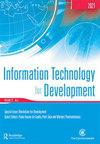手机用于社会包容:尼日利亚境内流离失所者的案例
IF 5.1
3区 管理学
Q1 DEVELOPMENT STUDIES
引用次数: 3
摘要
摘要国内流离失所者(IDP)在ICT4D研究中受到的关注较少。这项研究考察了非洲境内流离失所者如何使用手机来增强他们的社会包容性。我们采用森的能力方法作为理论视角,并采用定性案例研究作为方法论。从尼日利亚21名冲突引发的国内流离失所者身上获得的定性数据表明,手机不仅是克服与社区脱节的自助商品,也是增强他们个人和集体能力的一种手段,从而促进他们的社会包容。然而,产生这些能力取决于IDP的个人、社会和环境经验。有了这些发现,这项研究为理论、研究和实践做出了贡献。本文章由计算机程序翻译,如有差异,请以英文原文为准。
Mobile phone use for social inclusion: the case of internally displaced people in Nigeria
ABSTRACT Internally Displaced People (IDP) have received less attention in ICT4D research. This study examines how IDP in Africa use mobile phones to enhance their social inclusion. We employed Sen’s Capability Approach as the theoretical lens and a qualitative case study as a methodology. Qualitative data obtained from 21 conflict-induced IDP in Nigeria suggests that mobile phones serve not only as a self-help commodity to overcome disconnection from their communities but also a means to enhance their individual and collective capabilities, which in turn fosters their social inclusion. However, generating these capabilities depend on the personal, social, and environmental experiences of IDP. With these findings, the study offers contributions to theory, research, and practice.
求助全文
通过发布文献求助,成功后即可免费获取论文全文。
去求助
来源期刊

Information Technology for Development
Multiple-
CiteScore
11.30
自引率
16.70%
发文量
34
期刊介绍:
Information Technology for Development , with an established record for publishing quality research and influencing practice, is the first journal to have explicitly addressed global information technology issues and opportunities. It publishes social and technical research on the effects of Information Technology (IT) on economic, social and human development. The objective of the Journal is to provide a forum for policy-makers, practitioners, and academics to discuss strategies and best practices, tools and techniques for ascertaining the effects of IT infrastructures in government, civil societies and the private sector, and theories and frameworks that explain the effects of IT on development. The concept of development relates to social, economic and human outcomes from the implementation of Information and Communication Technology (ICT) tools, technologies, and infrastructures. In addition to being a valuable publication in the field of information systems, Information Technology for Development is also cited in fields such as public administration, economics, and international development and business, and has a particularly large readership in international agencies connected to the Commonwealth Secretariat, United Nations, and World Bank.
 求助内容:
求助内容: 应助结果提醒方式:
应助结果提醒方式:


